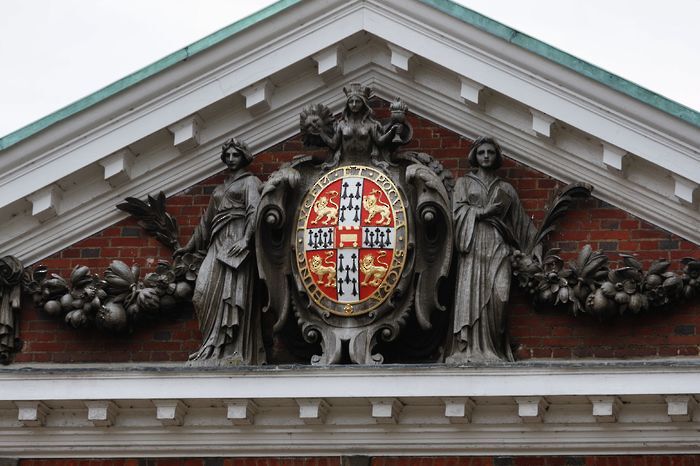Staff strikes and Brexit: What you missed in the vice-chancellor’s annual address
In his half-hour address, Stephen Toope touched on the prospect of potential strike action over pay, Brexit, and carbon emissions

Content note: this article contains mention of sexual assault and rape
Vice-Chancellor Stephen Toope made his annual address to Senate House on Tuesday, emphasising the significance of Cambridge’s status as a “global” institution and highlighting the challenges of continued Brexit uncertainty.
In his half-hour address, Toope touched on several contentious issues, including the prospect of potential strike action over pay and over pensions in the coming term. Other topics, however, such as the controversy surrounding the dismissal of multiple students’ sexual misconduct complaints this summer, received little or no mention.
Toope said that he was “troubled” by the imminent prospect of industrial action from staff over pay and pensions at a time which he deemed to be “a critical juncture for the country and for the University.”
He noted that the University will “keep exploring options to enhance our staff’s total compensation package” by focusing on staff benefits such as childcare support and housing assistance. When it comes to pensions, a topic which has in recent years been highly contested both within Cambridge and higher education institutions across the country, Toope said that the University “will strive to find creative solutions to reach an agreement leading to a sustainable pensions system,” which would be agreeable to employees and employers alike.
One of the University’s ambitions for the year, he emphasised, was to be “a place to work where staff are – and feel – trusted and valued.”
Toope welcomed the University’s new disciplinary procedures, in place from 1st October. Notably, the criminal standard of proof used in student disciplinary proceedings was replaced by the civil standard of proof, to a balance of probabilities. He said that the reformed procedures, which come after years of student-led campaigning, have given the University “the means to better challenge inappropriate behaviour, and the tools to better support complainants.”
Toope made no mention of the widely-publicised ruling, made in June, which saw multiple students’ complaints of sexual misconduct stopped in their tracks without investigation.
This summer, it was revealed that at least two formal complaints of sexual assault and rape had been dismissed, following a decision made by one chair of the University’s Disciplinary Committee to exclude sexual misconduct from the official definition of harassment in disciplinary procedures.
This decision cannot be reversed, and those whose complaints have been dismissed are unable to appeal within University systems.
Since then, the loophole in the disciplinary procedures has been covered in national publications including both the Guardian and the BBC, with lawyers and women’s groups having branded the change ‘unlawful’. A Queens’ junior research fellow and barrister has called for an “independent inquiry” into the change, and recent Cambridge graduate Dani Bradford announced in July that she is suing the University for its handling of her sexual misconduct complaint from several years ago.
Meanwhile, although only briefly mentioned by Toope, the University’s research-led inquiry into its historic links to the Atlantic slave trade was presented as an example of the University’s responsibility to respond “as the world changes”.
The inquiry, he said, is not designed to “atone, or to undermine this university’s proud history in the abolition movement, but to better understand and acknowledge our own complex, multi-layered past, and how that may affect our future.”
While describing a “constant process of change” at Cambridge, Toope discussed the decision made by mature womens’ college Lucy Cavendish College to admit both men and women from the age of 18 from 2021. This, he said, was “itself an example of the University adapting to meet new social needs”.
Toope went on to note the record number of colleges led by women this year, with Trinity College, Jesus College, and St Edmund’s College each welcoming their first female heads this term.
No mention was made of the fact that Sonita Alleyne, the new Jesus Master, is the first black head of an Oxbridge college.
Toope repeatedly emphasised the importance of being a “global” institution, specifically highlighting the significance of the European Research Council (ERC) to Cambridge. He cited the 21 new ERC grants awarded to Cambridge in the past year as an example of how “crucial” this European landscape has been to the University, and expressed concern about the continued “uncertainty” surrounding Brexit which, he said, affects “both current and prospective” students.
Tackling the climate crisis was another issue on which Toope emphasised the importance of a “global” approach, noting that Cambridge is a member of the newly formed Global Universities Alliance on Climate.
Announcing the upcoming formal launch of Cambridge Zero, the University’s new programme aiming to respond to the climate crisis and work towards a zero-carbon future, Toope said that the urgency of combating climate change was “underscored this past summer, when staff at our own Botanic Garden reported the highest UK temperature on record”.
The University has pledged to fulfil “science-based targets” of committing to 75% decrease in 2015 energy-related carbon emissions by 2030, and cutting their carbon emissions to zero by 2048.
 News / Cambridge don appointed Reform adviser23 October 2025
News / Cambridge don appointed Reform adviser23 October 2025 Arts / Why is everybody naked?24 October 2025
Arts / Why is everybody naked?24 October 2025 Comment / On overcoming the freshers’ curse22 October 2025
Comment / On overcoming the freshers’ curse22 October 2025 Arts / Why Cambridge’s architecture never lives up to the ‘dark academia’ dream 17 October 2025
Arts / Why Cambridge’s architecture never lives up to the ‘dark academia’ dream 17 October 2025 News / How much does your college master earn?17 October 2025
News / How much does your college master earn?17 October 2025









